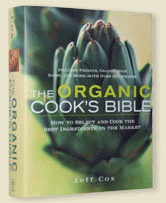The Inherent Morality of the Organic Ideal
Organic Lifestyle Comments Off on The Inherent Morality of the Organic Ideal
Most people, if not all, are inculcated with a sense of morality as they grow up. It begins with “Don’t hit your sister,” (or brother), and the learning curve takes the child through the socializing steps that lead to an ethical, moral adult.
Well, now the Supreme Court, in its recent decision of Citizens United, tells us that corporations are people. But corporations act like selfish, unscrupulous, sociopathic criminals. Their motivation is to create wealth for themselves. They trash the world, frack the earth, poison the people and animals who depend on them for food, tear open nature’s precious genomes and create monsters, destroy the environment, pay their employees pittances and their executives obscenely large salaries. If real people acted the way corporations do, they’d be in jail, or in mental institutions.
So why should corporations be allowed to act like criminals, if they are indeed people. How come they don’t have to behave ethically and morally, but we actual people do?
The answer, of course, is that they aren’t people. Their behavior is only restrained by laws, but these days, they own the lawmakers, and so they’ve been deregulated. The restraints are off. They do what they want. And so they proceed to plunder and pillage, and if they were sexual beings, they’d rape.
I’m sorry, but the Roberts Supreme Court—that legacy handed to us by George W. Bush—is the worst excuse for a Supreme Court since Roger Taney’s Court handed down the Dred Scott decision in 1857. Google it, if you’re interested.
There can be no progress on controlling corporate excess and turning back the march toward extinction represented by global climate change until our economic system is seen as a way of doing business by the corporations, of the corporations, and for the corporations. There is little morality at all to it, if one defines morality as creating conditions that benefit everyone equally. It is inherently not only amoral, but immoral. People starve, are homeless, die in the streets, while Exxon and the Koch brothers see millions of dollars pour into their bank accounts day by day by day.
What would a moral way of doing business look like? It would look a lot like the way a single, moral human being would act. Here are some bullet points:
• It would be kind. There would be work for everyone, meaning work wouldn’t be shipped overseas to factories staffed by impoverished workers who would accept starvation wages simply to survive. Workers would be paid a fair wage. Men and women would be paid the same for the same work. Workers would be treated with respect, and treated fairly. Kindness is a virtue. Companies would act virtuously.
• It would respect the beauty of the earth and the earth’s natural systems. Instead of mountaintop removal to get at dirty coal, it would turn its muscle toward renewable energy sources—solar, wind, hydroelectric, heat pumps, and many other non-extractive and gentle methods of generating power. It would pattern agriculture on nature’s systems, rather than on toxic chemicals to kill and pollute nature’s systems.
• It would be transparent and true. The lies, subterfuges, coverups, lobbying, under-the-table money, propaganda, and all the rest of the dirty dealing would stop. Truth would be counted at a premium, just as it is with human beings.
There’s lots more to this, but the idea is simple. Once you know what organics is all about, you understand that it is a moral system of developing our life-support systems for food and livelihood. As we would be ourselves, as persons, that’s how our economic system should be—and all our systems, really.
What Citizens United says is that the anti-social, rapacious, selfish system of our economy is what humanity is all about. It’s a horrible perversion of the truth. In my opinion, Roberts, Scalia, Thomas, Alito, and Kennedy should all be recalled, for they are a danger to us all and to the American way of life.
***
IT’S SMALL, BUT IT’S A START
The United States Department of Agriculture has announced that it will spend $52 million to support local and regional food systems like farmers’ markets and food hubs and to spur research on organic farming, according to The New York Times.
The local food movement has been one of the fastest growing segments of
the business, as consumers seek to know more about where, how and by
whom their food is grown. But local farmers still struggle to market their food. Distribution systems are intended to accommodate the needs of large-scale commercial farms and growers. Grocery stores and restaurants largely rely on big distribution centers and are only beginning to figure out how to incorporate small batches of produce into their overall merchandise mixes.
Farmers’ markets are proliferating around the country, increasing 76 percent
to 8,268 since 2008, according to the Agriculture Department.
The $52 million will be the first outlay to local and organic enterprises of
the farm bill signed into law by President Obama in February, which tripled
the amount of money aimed at that sector to $291 million. The organic
business, which has long complained that the Agriculture Department does
not support it financially, will get $125 million over the next five years for
research and $50 million for conservation programs.
***
ORGANIC FOOD REDUCES RISK OF HEAVY METAL POISONING
Scientists have long recognized the dangers of cadmium (Cd) exposure to the human body. This heavy metal is emerging as a major cause of vascular disorders, common cancers, osteoporosis, and kidney disease, and can also cause damage to the body’s reproductive and neurological systems. While tobacco smoke can be a significant source of exposure for smokers, the primary source of cadmium exposure for nonsmokers is through consumption of plant-based foods contaminated with Cd from pesticides.
A survey of all previous pertinent research (meta-analysis), appearing recently in the British Journal of Nutrition, concluded that organically grown foods are on average 48 percent lower in Cd than conventionally grown foods. Now, in an invited commentary appearing in the same journal, Saint Luke’s Mid America Heart Institute cardiovascular research scientist James J. DiNicolantonio, Pharm.D., and Mark F. McCarty, B.A., place this finding in the context of the growing epidemiology linking Cd exposure to adverse health outcomes, and conclude that consistent consumption of organic foods over a lifetime could be expected to favorably influence health and mortality risk.
“For years, nutritionists and consumers have struggled with the question, ‘is organic really better?’” said Dr. DiNicolantonio. “What analysis of this research reveals is that, due to the serious health impacts of cadmium exposure and the markedly lower levels of Cd in organically grown foods, the long-term consumption of such foods is likely to be notably protective with respect to a wide range of common pathologies.”
***
CONSUMERS UNION SAYS ‘NO ON 92’ IS A CON
Consumers Union is disputing claims made in ads opposing Measure 92, the Oregon ballot initiative that would require GMO foods to be so labeled, that labeling will force farmers and food producers to spend “millions” and increase food costs for consumers.
The group also takes issue with the assumptions made by industry-funded studies that it says have overestimated the cost of similar GMO labeling proposals in California, Washington and New York.
“Industry cost estimates incorporate unrealistic assumptions about how GMO labeling requirements will drive food producers to switch to all organic ingredients, which would be much more expensive. However, there is no factual basis for this assumption and we believe producers will continue to sell GMO foods once they are labeled, and many consumers will continue to buy them, with no discernible price impact,” asserted CU. “Measure 92 simply requires foods that contain genetically engineered ingredients to be labeled so that consumers can make an informed choice.”
Genetically engineered foods are already required to be labeled in 64 foreign countries, including many where American food producers sell their wares. Labeling has not increased food prices in those countries, according to Consumers Union.
“Producers are required to label foods that are frozen, from concentrate, homogenized, or irradiated, as well as a food’s country of origin. Poll after poll has found that more than 90 percent of consumers want foods that are genetically engineered to be labeled,” CU noted.
In addition to the Oregon initiative, a GMO labeling requirement is on the ballot in Colorado in November. Vermont has already passed legislation requiring GMO labeling, and legislatures in dozens of other states are considering similar labeling bills.
***
NEONICOTINOID RESIDUES FOUND IN COMMON FOODSTUFFS
According to a study conducted by scientists from Harvard University and published in the Journal of Agricultural and Food Chemistry, neonicotinoid residues are often found in many of the most commonly consumed fruits and vegetables.
Neonicotinoids are the most common class of insecticide used in conventional agriculture, and are applied directly to the plant or the soil where they can be taken up by roots and stored in plant tissues. Results from the study suggest that exposure to neonicotinoid insecticides in produce sold for human consumption may be more common than previously thought.
“All fruit and vegetable samples, with the exception of nectarine and tomato, tested positive for at least one neonicotinoid,” and most fruits and almost half of all vegetables tested had residues of at least two different neonicotinoids, the study found. Neonicotinoids have been implicated as a cause for honeybee die-offs, and recent studies suggest they may also have negative health effects on mammals. The authors have called for an assessment of dietary neonicotinoid intakes and the potential effects they may have on human health.
IFOAM PRESIDENT EXPLODES THE MYTHS OF SAFE PESTICIDES
Andre Leu is a longtime organic farmer in Australia and current President of the International Federation of Organic Agriculture Movements (IFOAM). He has written a book entitled “The Myths of Safe Pesticides,” and it’s one that should wake people up to the fact that our pesticide-drenched conventional food supply is poisoning the environment, farm workers, and the public. Here are the myths he explodes:
The “Rigorously Tested” Myth. Are pesticides tested for safety before going on the market?
The “Very Small Amount” Myth. Can even a small amount of chemical residue be harmful?
The “Breakdown” Myth. Do pesticides rapidly biodegrade, and are the breakdown products truly harmless?
The “Reliable Regulatory Authority” Myth. Do the regulatory authorities review unbiased evidence before declaring a product safe?
The “Pesticides Are Essential to Farming” Myth. Are pesticides the only thing keeping our planet from starvation?
Leu shows in detail how they are all myths, without much basis in reality. It’s an important book, has a foreword by Vandana Shiva, amd is published by Acres USA. Buy a few copies to give to folks who tell you that you are being alarmist to eat organic food, and that the food supply is perfectly safe. If they read this book, they will change their minds.
###












